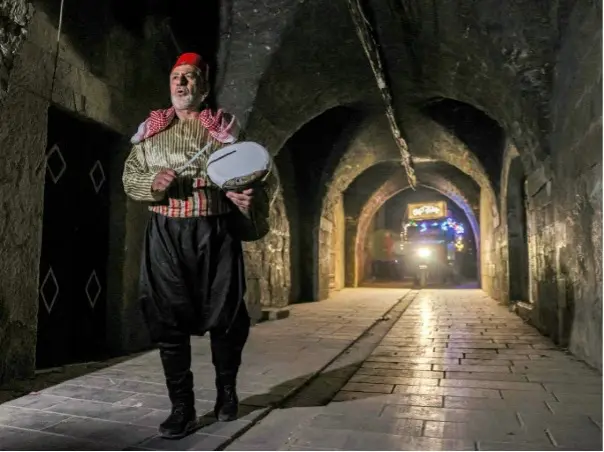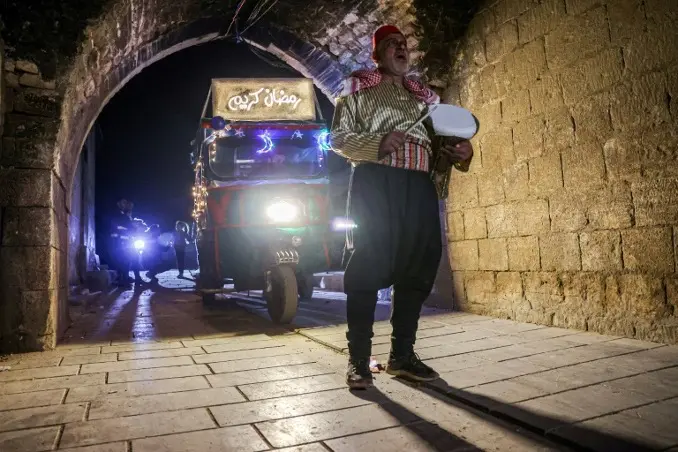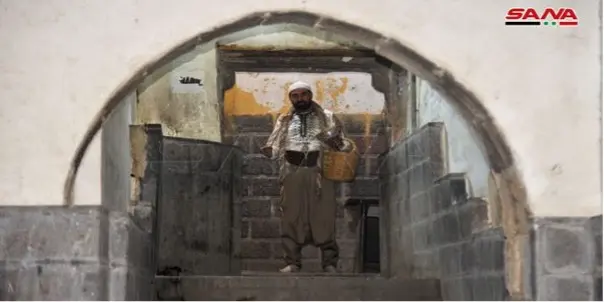Tradition of the drummer (masaharati) during the month of Ramadan in Damascus

During the holy month of Ramadan, which marks the ninth month of the lunar Islamic calendar, all Muslims are required to fast, i.e. abstain from food and drink from dawn to dusk for 30 days. Since Ramadan is approximately 11 days ahead each year in the Gregorian solar calendar, Muslims experience Ramadan in different seasons throughout their lives.
Show key points
- Fasting during the month of Ramadan, which lasts 30 days, is a religious obligation for all healthy adult Muslims and is one of the five pillars of Islam.
- The purpose of fasting is to cultivate gratitude and empathy by experiencing hunger, thus aligning with the struggles of the less fortunate.
- Suhoor, the pre-dawn meal before fasting begins, is an important part of Ramadan, and in some cultures, it includes dinner-style dishes rather than just breakfast items.
- ADVERTISEMENT
- Traditionally, people known as Masaharati or "magicians" roam the streets to wake Muslims for Suhoor, singing religious songs and beating drums.
- Despite technological advances, the Masaharati tradition is still alive in Damascus, where dedicated individuals like Hassan Al-Rashi and Sharif Harsho carry on this cultural legacy.
- Sharif Harsho, who inherited the role from his father, views his participation as a personal mission to uphold heritage despite challenges like war and the pandemic.
- This cherished Ramadan tradition, alongside lanterns and festive meals, remains a vital expression of cultural identity and communal spirit in Syrian society.
The act of fasting aims to remind Muslims of poor and hungry people and reinforce the need for gratitude. As one of the five pillars or duties of Islam, fasting the month of Ramadan is mandatory for all healthy adult Muslims. This excludes children who have not reached puberty, the elderly, those who are physically or mentally unable to fast, pregnant and lactating women and travelers.
Recommend
Fasting in the month of Ramadan means abstaining from all food or drink, including water and chewing gum, from dawn to sunset. It is recommended before sunrise for Muslims to eat the iftar known as suhoor. This meal often resembles breakfast, but in some cultures it may include more dinner-like foods.
One of the Ramadan traditions is that there are people who wake up the believers for this suhoor meal, and these people are called the magicians. Traditional magicians beat drums and chant religious songs to wake Muslims up before sunrise for Suhoor

Although this tradition is about to disappear in some Islamic countries, this tradition still exists in the Syrian capital, Damascus, despite the increasing reliance on smartphones, about an hour before the dawn call to prayer, drummers Ramadan known as "Al-Masharati" walk in the narrow streets to wake up the believers, and among the thirty magicians who remained in Damascus is Hassan Al-Rashi, 60 years (the old drummer), who mentions that the tradition dates back to a time when electronic alerts were not available, he says:
"Our grandparents only relied on the Mesaharati to wake up because at that time there were no bells or cell phones." Times have changed now, but people in Syria do not forget their traditions.
"The character of the magician is also part of the tradition so we will not forget or abandon it."
The voice of the magician breaks the silence of the night in the capital's old city and Rashi says: "Wake up for suhoor, Ramadan has come to visit you." "People still want to wake up to the sound of Masaharati, it is part of our customs and traditions, a legacy we will not leave behind."
While performing the Masaharati mission, Rashi carries a bamboo cane in one hand and a goatskin drum in the other as he quickly walks from house to house using his cane to knock on the doors of families who have requested his services. For Rashi, it's not about free gifts: "We feel happy when we go out every day," he says, adding, "Sometimes some kids follow us and ask for the drum to beat."

Before the call to prayer, Sherif Harsho (51), another Mesharati asks one of his neighbors for a glass of water before starting his fast, and he usually accompanies Rashi and beats his drum with him. "My equipment is simple, which is my voice, my drum and my stick, so I only call out my voice using a simple goatskin drum and this wooden stick," says Sharif, adding: "The drum is the same as the one used in the past and has not changed over the centuries."
Sharif, whose father was also a magician in Ramadan, performed this duty nearly a quarter of a century ago, and says: "The ongoing war on Syria for more than a decade and the Corona pandemic did not prevent him from continuing," and adds: "I will continue to wake people up for Suhoor as long as I have a voice in my throat, it is a duty I inherited from my father and I will pass it on to my son."
The Masaharati tradition is one of the beloved traditions of the blessed Ramadan, in addition to the Ramadan lanterns and delicious traditional dishes.... It is remarkable that Damascus still retains this tradition of ancient heritage, and the month of goodness is not complete without this beautiful tradition.








